Before用作连词时
- 格式:doc
- 大小:27.00 KB
- 文档页数:4
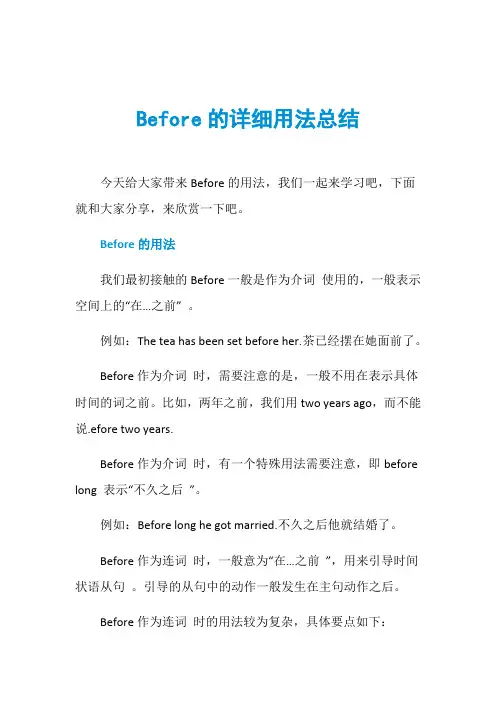
Before的详细用法总结今天给大家带来Before的用法,我们一起来学习吧,下面就和大家分享,来欣赏一下吧。
Before的用法我们最初接触的Before一般是作为介词使用的,一般表示空间上的“在…之前” 。
例如:The tea has been set before her.茶已经摆在她面前了。
Before作为介词时,需要注意的是,一般不用在表示具体时间的词之前。
比如,两年之前,我们用two years ago,而不能说.efore two years.Before作为介词时,有一个特殊用法需要注意,即before long 表示“不久之后”。
例如:Before long he got married.不久之后他就结婚了。
Before作为连词时,一般意为“在…之前”,用来引导时间状语从句。
引导的从句中的动作一般发生在主句动作之后。
Before作为连词时的用法较为复杂,具体要点如下:一、主句用一般现在时/一般将来时,从句用一般现在时。
例如:You should let me explain what I did before you criticize me.在你批评我之前,你应该让我解释一下我做过什么。
二、主句用过去完成时,从句用一般过去时。
一般翻译为“在…之前就… ”。
例如:1.His father had died before he was born.他父亲在他出生之前就已经去世了。
2.She had finished her homework before her mother returned.她在妈妈返回之前就已经把作业完成了。
三、主句用一般过去时,从句用过去完成时。
从句用过去完成时表示一个过去没有完成或没来得及做的、时间顺序在后的动作,常译为“★还没(来得及)…就…★ ”。
例如:1.He rushed out of the office before I had realized what was happening.我还没意识到发生了什么事,他就冲出去了。
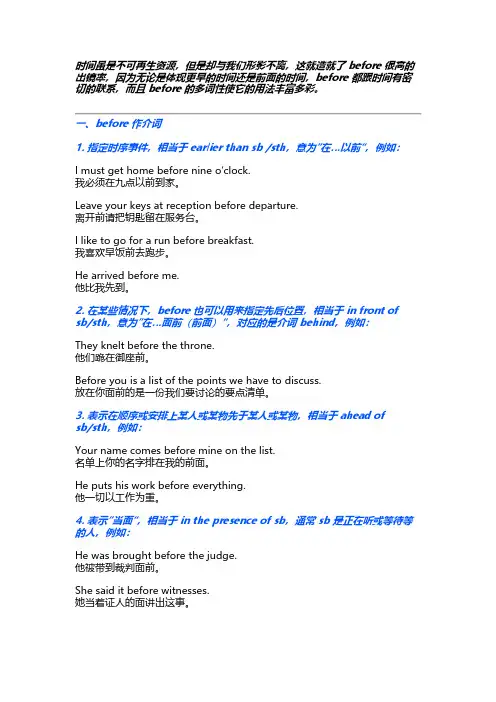
时间虽是不可再生资源,但是却与我们形影不离,这就造就了 before 很高的出镜率,因为无论是体现更早的时间还是前面的时间,before 都跟时间有密切的联系,而且 before 的多词性使它的用法丰富多彩。
一、before 作介词1. 指定时序事件,相当于 earlier than sb /sth,意为”在…以前“,例如:I must get home before nine o’clock.我必须在九点以前到家。
Leave your keys at reception before departure.离开前请把钥匙留在服务台。
I like to go for a run before breakfast.我喜欢早饭前去跑步。
He arrived before me.他比我先到。
2. 在某些情况下,before 也可以用来指定先后位置,相当于 in front of sb/sth,意为”在…面前(前面)“,对应的是介词 behind,例如:They knelt before the throne.他们跪在御座前。
Before you is a list of the points we have to discuss.放在你面前的是一份我们要讨论的要点清单。
3. 表示在顺序或安排上某人或某物先于某人或某物,相当于 ahead ofsb/sth,例如:Your name comes before mine on the list.名单上你的名字排在我的前面。
He puts his work before everything.他一切以工作为重。
4. 表示”当面“,相当于 in the presence of sb,通常 sb 是正在听或等待等的人,例如:He was brought before the judge.他被带到裁判面前。
She said it before witnesses.她当着证人的面讲出这事。

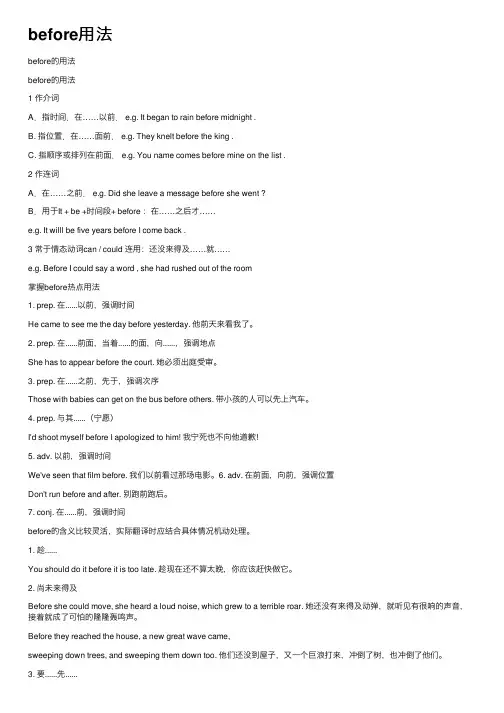
before⽤法before的⽤法before的⽤法1 作介词A.指时间.在……以前. e.g. It began to rain before midnight .B. 指位置.在……⾯前. e.g. They knelt before the king .C. 指顺序或排列在前⾯. e.g. You name comes before mine on the list .2 作连词A.在……之前. e.g. Did she leave a message before she went ?B.⽤于It + be +时间段+ before :在……之后才……e.g. It willl be five years before I come back .3 常于情态动词can / could 连⽤:还没来得及……就……e.g. Before I could say a word , she had rushed out of the room掌握before热点⽤法1. prep. 在......以前,强调时间He came to see me the day before yesterday. 他前天来看我了。
2. prep. 在......前⾯,当着......的⾯,向......,强调地点She has to appear before the court. 她必须出庭受审。
3. prep. 在......之前,先于,强调次序Those with babies can get on the bus before others. 带⼩孩的⼈可以先上汽车。
4. prep. 与其......(宁愿)I'd shoot myself before I apologized to him! 我宁死也不向他道歉!5. adv. 以前,强调时间We've seen that film before. 我们以前看过那场电影。

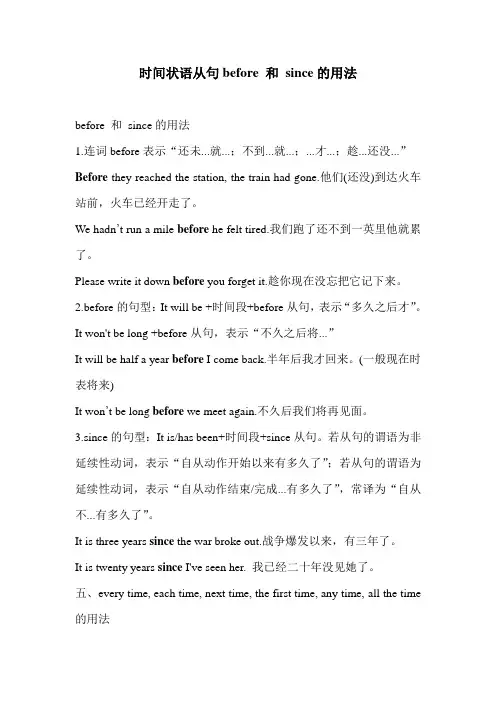
时间状语从句before 和since的用法before 和since的用法1.连词before表示“还未...就...;不到...就...;...才...;趁...还没...”Before they reached the station, the train had gone.他们(还没)到达火车站前,火车已经开走了。
We hadn’t run a mile before he felt tired.我们跑了还不到一英里他就累了。
Please write it down before you forget it.趁你现在没忘把它记下来。
2.before的句型:It will be +时间段+before从句,表示“多久之后才”。
It won't be long +before从句,表示“不久之后将...”It will be half a year before I come back.半年后我才回来。
(一般现在时表将来)It won’t be long before we meet again.不久后我们将再见面。
3.since的句型:It is/has been+时间段+since从句。
若从句的谓语为非延续性动词,表示“自从动作开始以来有多久了”;若从句的谓语为延续性动词,表示“自从动作结束/完成...有多久了”,常译为“自从不...有多久了”。
It is three years since the war broke out.战争爆发以来,有三年了。
It is twenty years since I've seen her. 我已经二十年没见她了。
五、every time, each time, next time, the first time, any time, all the time 的用法这些短语用来引导时间状语从句,表示“每当..;每次...;下次...”等。
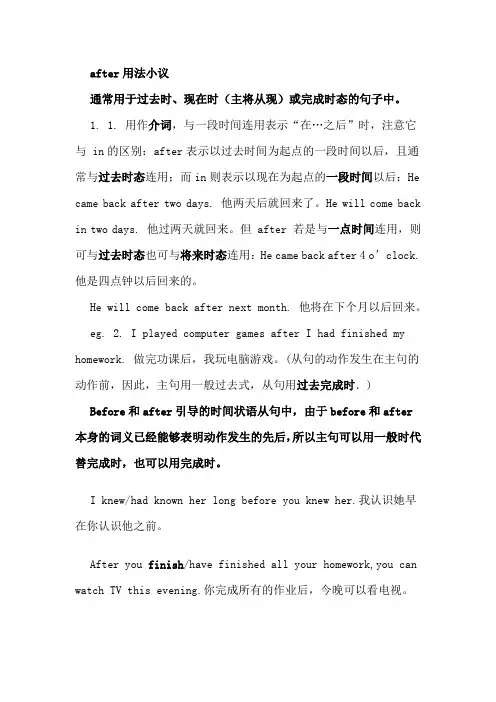
after用法小议通常用于过去时、现在时(主将从现)或完成时态的句子中。
1. 1. 用作介词,与一段时间连用表示“在…之后”时,注意它与 in的区别:after表示以过去时间为起点的一段时间以后,且通常与过去时态连用;而in则表示以现在为起点的一段时间以后:He came back after two days. 他两天后就回来了。
He will come back in two days. 他过两天就回来。
但 after 若是与一点时间连用,则可与过去时态也可与将来时态连用:He came back after 4 o’clock. 他是四点钟以后回来的。
He will come back after next month. 他将在下个月以后回来。
eg. 2. I played computer games after I had finished my homework. 做完功课后,我玩电脑游戏。
(从句的动作发生在主句的动作前,因此,主句用一般过去式,从句用过去完成时.) Before和after引导的时间状语从句中,由于before和after本身的词义已经能够表明动作发生的先后,所以主句可以用一般时代替完成时,也可以用完成时。
I knew/had known her long before you knew her.我认识她早在你认识他之前。
After you finish/have finished all your homework,you can watch TV this evening.你完成所有的作业后,今晚可以看电视。
2. 用作连词引导时间状语从句时注意:若主句用将来时态 (或含有将来意味),则时间状语从句要用一般现在时态 (表将来意义)表将来意义,而不能直接使用将来时态:他回来后我就走。
正:I’ll leave after he comes back.误:I’ll leave after he will come back.3. 用作副词,表示“后来”、“ (一段时间)以后”,通常放在表示时间的副词之后:soon after 不久以后 two days after两天后The plane was hijacked soon after it took off.Two days later he was gone.4. 用于习语after all 终究,毕竟:I was right after all. 毕竟我是对的。
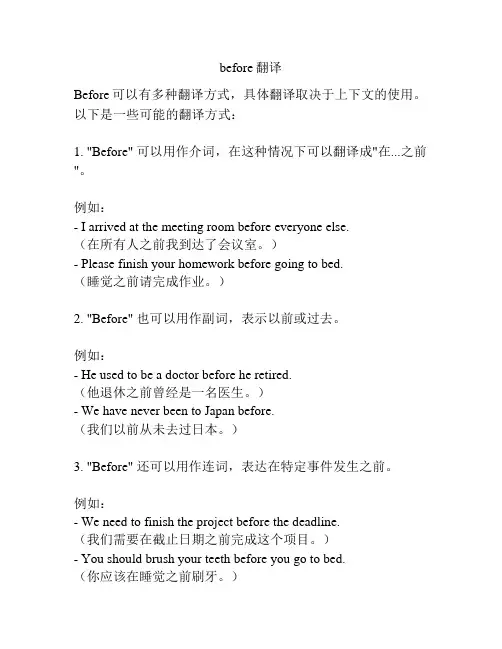
before翻译
Before可以有多种翻译方式,具体翻译取决于上下文的使用。
以下是一些可能的翻译方式:
1. "Before" 可以用作介词,在这种情况下可以翻译成"在...之前"。
例如:
- I arrived at the meeting room before everyone else.
(在所有人之前我到达了会议室。
)
- Please finish your homework before going to bed.
(睡觉之前请完成作业。
)
2. "Before" 也可以用作副词,表示以前或过去。
例如:
- He used to be a doctor before he retired.
(他退休之前曾经是一名医生。
)
- We have never been to Japan before.
(我们以前从未去过日本。
)
3. "Before" 还可以用作连词,表达在特定事件发生之前。
例如:
- We need to finish the project before the deadline.
(我们需要在截止日期之前完成这个项目。
)
- You should brush your teeth before you go to bed.
(你应该在睡觉之前刷牙。
)
需要根据具体的上下文进一步确定翻译方式。
请提供更多详细信息,以便我可以给出更准确的翻译。
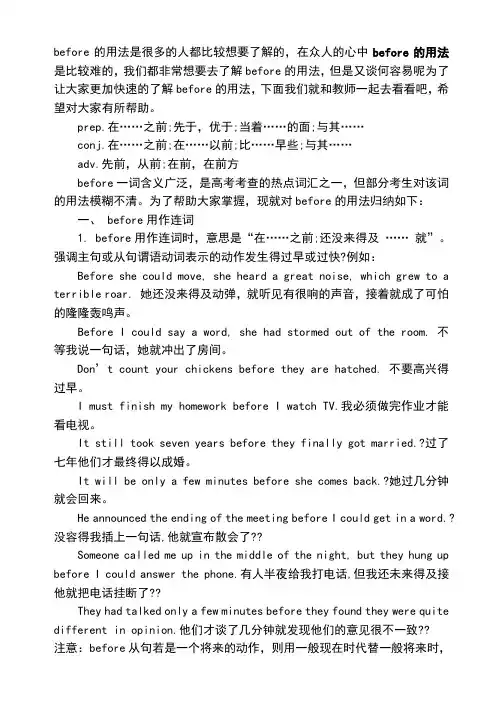
before的用法是很多的人都比较想要了解的,在众人的心中before的用法是比较难的,我们都非常想要去了解before的用法,但是又谈何容易呢为了让大家更加快速的了解before的用法,下面我们就和教师一起去看看吧,希望对大家有所帮助。
prep.在……之前;先于,优于;当着……的面;与其……conj.在……之前;在……以前;比……早些;与其……adv.先前,从前;在前,在前方before一词含义广泛,是高考考查的热点词汇之一,但部分考生对该词的用法模糊不清。
为了帮助大家掌握,现就对before的用法归纳如下:一、 before用作连词1. before用作连词时,意思是“在……之前;还没来得及…… 就”。
强调主句或从句谓语动词表示的动作发生得过早或过快?例如:Before she could move, she heard a great noise, which grew to a terrible roar. 她还没来得及动弹,就听见有很响的声音,接着就成了可怕的隆隆轰鸣声。
Before I could say a word, she had stormed out of the room. 不等我说一句话,她就冲出了房间。
Don’t count your chickens before they are hatched. 不要高兴得过早。
I must finish my homework before I watch TV.我必须做完作业才能看电视。
It still took seven years before they finally got married.?过了七年他们才最终得以成婚。
It will be only a few minutes before she comes back.?她过几分钟就会回来。
He announced the ending of the meeting before I could get in a word.?没容得我插上一句话,他就宣布散会了??Someone called me up in the middle of the night, but they hung up before I could answer the phone.有人半夜给我打电话,但我还未来得及接他就把电话挂断了??They had talked only a few minutes before they found they were quite different in opinion.他们才谈了几分钟就发现他们的意见很不一致??注意:before从句若是一个将来的动作,则用一般现在时代替一般将来时,如上句中的comes。
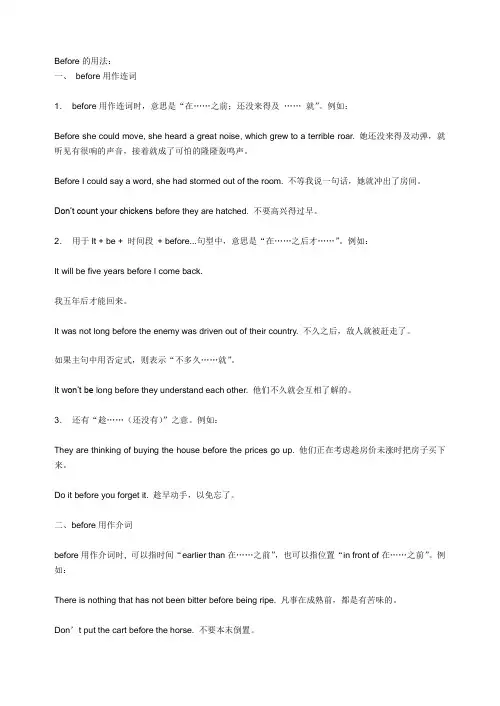
Before的用法:一、before用作连词1.before用作连词时,意思是“在……之前;还没来得及……就”。
例如:Before she could move, she heard a great noise, which grew to a terrible roar. 她还没来得及动弹,就听见有很响的声音,接着就成了可怕的隆隆轰鸣声。
Before I could say a word, she had stormed out of the room. 不等我说一句话,她就冲出了房间。
Don’t count your chickens before they are hatched. 不要高兴得过早。
2.用于It + be + 时间段+ before...句型中,意思是“在……之后才……”。
例如:It will be five years before I come back.我五年后才能回来。
It was not long before the enemy was driven out of their country. 不久之后,敌人就被赶走了。
如果主句中用否定式,则表示“不多久……就”。
It won’t be long before they understand each other. 他们不久就会互相了解的。
3.还有“趁……(还没有)”之意。
例如:They are thinking of buying the house before the prices go up. 他们正在考虑趁房价未涨时把房子买下来。
Do it before you forget it. 趁早动手,以免忘了。
二、before用作介词before用作介词时, 可以指时间“earlier than在……之前”,也可以指位置“in front of在……之前”。
例如:There is nothing that has not been bitter before being ripe. 凡事在成熟前,都是有苦味的。
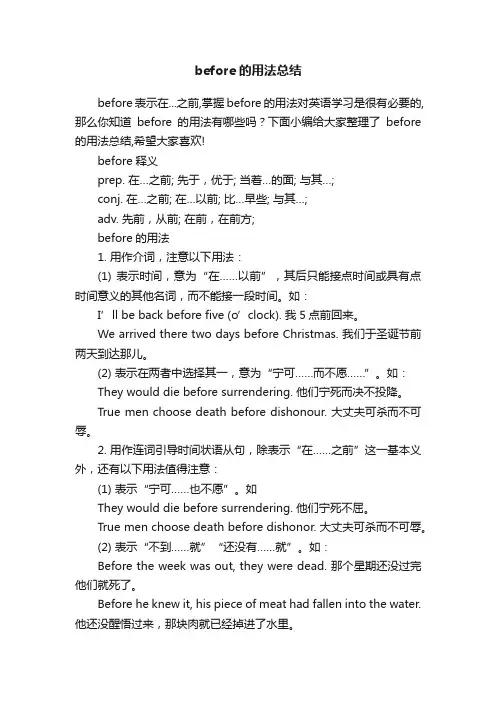
before的用法总结before表示在...之前,掌握before的用法对英语学习是很有必要的,那么你知道before的用法有哪些吗?下面小编给大家整理了before 的用法总结,希望大家喜欢!before释义prep. 在…之前; 先于,优于; 当着…的面; 与其…;conj. 在…之前; 在…以前; 比…早些; 与其…;adv. 先前,从前; 在前,在前方;before的用法1. 用作介词,注意以下用法:(1) 表示时间,意为“在……以前”,其后只能接点时间或具有点时间意义的其他名词,而不能接一段时间。
如:I’ll be back before five (o’clock). 我5点前回来。
We arrived there two days before Christmas. 我们于圣诞节前两天到达那儿。
(2) 表示在两者中选择其一,意为“宁可……而不愿……”。
如:They would die before surrendering. 他们宁死而决不投降。
True men choose death before dishonour. 大丈夫可杀而不可辱。
2. 用作连词引导时间状语从句,除表示“在……之前”这一基本义外,还有以下用法值得注意:(1) 表示“宁可……也不愿”。
如They would die before surrendering. 他们宁死不屈。
True men choose death before dishonor. 大丈夫可杀而不可辱。
(2) 表示“不到……就”“还没有……就”。
如:Before the week was out, they were dead. 那个星期还没过完他们就死了。
Before he knew it, his piece of meat had fallen into the water. 他还没醒悟过来,那块肉就已经掉进了水里。
(3) 表示“以免”“免得”。
精心整理before的用法是很多的人都比较想要了解的,在众人的心中before的用法是比较难的,我们都非常想要去了解before 的用法,但是又谈何容易呢?为了让大家更加快速的了解before的用法,下面我们就和教师一起去看看吧,希望对大家有所帮助。
现就对及eroar.她还没来得及动弹,就听见有很响的声音,接着就成了可怕的隆隆轰鸣声。
BeforeIcouldsayaword,shehadstormedoutoftheroom.不等我说一句话,她就冲出了房间。
Don’tcountyourchickensbeforetheyarehatched.不要高兴得过早。
ImustfinishmyhomeworkbeforeIwatchTV.我必须做完作业才能看电视。
Itstilltooksevenyearsbeforetheyfinallygotmarried.?过了七年他们才最终得以成婚。
一致注意:before从句若是一个将来的动作,则用一般现在时代替一般将来时,如上句中的comes。
2.用于It+be+时间段+before...句型中,意思是“在……之后才……”。
例如:ItwillbefiveyearsbeforeIcomeback.我五年后才能回来。
Itwasnotlongbeforetheenemywasdrivenoutoftheircountry.不久之后,敌人就被赶走了。
如果主句中用否定式,则表示“不多久……就”。
Itwon’tbelongb eforetheyunderstandeachother.他们不久就他之前”(1成(2Ladiesbeforegentlemen.女士优先。
(3)表示位置,与behind相对(相当于infrontof)。
如:BeforeLucyisLily.?莉莉在露茜的前面。
Don’tputthecartbeforet hehorse.不要本末倒置。
(4)表示“在……面前;与……面对面”。
英语中before的用法一、可以用作介词⒈)指时间上早于,在……之前,如:She has lived here since before the war.她从战前就一直在这儿住。
⒉)指位置在前面,如:We knelt down before Grandma's grave.我们在奶奶的墓前跪下。
⒊)指顺序或排列在之前,如:Your name comes before mine on the list. 名单上你的名字在我之前。
⒋)在某人面前,如:She said it before the witness.他是当着证人的面说的。
二、作为连词其基本含义是“在……之前”,又可以根据不同语境灵活翻译成“才”、“还没来得及就……”、“趁……”、“就”等。
具体用法如下:⒈)与情态动词can/could连用这时候从句虽为肯定形式,根据汉语表达习惯译成“还没来得及就”,如:Before I could get in a word,he had measured me.我还没来得及插话他就为我量好了尺寸。
Before she could move,she heard a loud noise,which grew to a terribl eroar.她还没来得及迈步,就听见一声巨响,接着就是可怕的隆隆轰鸣。
⒉)用于肯定句中强调主句所表达的时间,距离长,或花费的精力大,译成“才”We had sailed four days and four nights before we saw lands.我们航行了四天四夜才看到陆地。
We waited a long time before the train arrived.我们等了很长时间火车才到。
⒊)用于否定句中,强调主句所表达的时间,距离短,或花费的精力小,译成“不到……就”如:We hadn't run a mile before he felt tired.我们跑了还不到一英里他就累了。
关于before的用法及解释我们在英语中,常常会运用到before这个单词,所以对于before 的用法,相信很多的人都比较想要了解的,那么before的用法有哪些?下面是小编给大家带来的关于before的用法及解释_before的用法及句型,以供大家参考,我们一起来看看吧!before的解释prep. 在…之前; 先于,优于; 当着…的面; 与其…;conj. 在…之前; 在…以前; 比…早些; 与其…;adv. 先前,从前; 在前,在前方;before的用法1. 用作介词,注意以下用法:(1) 表示时间,意为“在……以前”,其后只能接点时间或具有点时间意义的其他名词,而不能接一段时间。
如:I’ll be back before five (o’clock). 我5点前回来。
We arrived there two days before Christmas. 我们于圣诞节前两天到达那儿。
(2) 表示在两者中选择其一,意为“宁可……而不愿……”。
如:They would die before surrendering. 他们宁死而决不投降。
True men choose death before dishonour. 大丈夫可杀而不可辱。
2. 用作连词引导时间状语从句,除表示“在……之前”这一基本义外,还有以下用法值得注意:(1) 表示“宁可……也不愿”。
如They would die before surrendering. 他们宁死不屈。
True men choose death before dishonor. 大丈夫可杀而不可辱。
(2) 表示“不到……就”“还没有……就”。
如:Before the week was out, they were dead. 那个星期还没过完他们就死了。
Before he knew it, his piece of meat had fallen into the water.他还没醒悟过来,那块肉就已经掉进了水里。
Before的详细用法总结今日给大家带来Before的用法,我们一起来学习吧,下面我就和大家共享,来观赏一下吧。
Before的用法我们最初接触的Before一般是作为介词使用的,一般表示空间上的“在…之前” 。
例如:The tea has been set before her.茶已经摆在她面前了。
Before作为介词时,需要留意的是,一般不用在表示详细时间的词之前。
比如,两年之前,我们用two years ago,而不能说.efore two years.Before作为介词时,有一个特别用法需要留意,即before long 表示“不久之后”。
例如:Before long he got married.不久之后他就结婚了。
Before作为连词时,一般意为“在…之前”,用来引导时间状语从句。
引导的从句中的动作一般发生在主句动作之后。
Before作为连词时的用法较为简单,详细要点如下:一、主句用一般现在时/一般将来时 ,从句用一般现在时。
例如:You should let me explain what I did before you criticize me.在你批判我之前,你应当让我解释一下我做过什么。
二、主句用过去完成时 ,从句用一般过去时。
一般翻译为“在…之前就… ”。
例如:1.His father had died before he was born.他父亲在他诞生之前就已经去世了。
2.She had finished her homework before her mother returned.她在妈妈返回之前就已经把作业完成了。
三、主句用一般过去时 ,从句用过去完成时。
从句用过去完成时表示一个过去没有完成或没来得及做的、时间挨次在后的动作,常译为“★还没(来得及)…就…★ ”。
例如:1.He rushed out of the office before I had realized what was happening.我还没意识到发生了什么事,他就冲出去了。
before 在英语中是一个比较常用的虚词,它既可作介词或副词用,也可作附属连词用。
在近几年的高测验题中通常出现考察其附属连词用法的标题。
下面就把before 作附属连词的用法归纳如下: 1. 表现“在……之前就……”。
比方:Mary had finished her homework before her mother returned.在她妈妈返来之前玛丽就已经完成了作业。
2. 表现“过了多久后才……;举动举行到什么程度才……”。
比方:The man almost knocked me down before he saw me.那个男子差点把我撞倒才望见我。
They walked about 30 miles to the west before they saw a village.他们西行了大略30 英里才望见一个墟落。
They worked day and night about three days before everything returned to normal.他们昼夜劳动了大略三天,一概才收复平常。
3. 表现“来不足;尚未……就……”。
比方:Before I could get in a word, he had measured me.我还没来得及插话,他就已经给我量好了尺寸。
He ran off before I could stop him.我还没来得及禁止他,他就已经跑了。
She left the company before I could have a word with her.我还没来得及和她打声招呼,她就已经脱离了。
4. 表现“刚……就……”。
比方:I had hardly sat down before the bell rang.我刚坐下铃就响了。
5. 表现“无声无息就……;还没弄清就……”。
比方:Time passed quickly and three months went by before Aqiao knew it.时间过得很快,无声无息阿巧已经度过了三个月。
Before用作连词时,意思是“在……之前”。
(注:此为核心概念,其它皆是繁衍派生之义)其实,它引导状语从句时,在不同的句式中以及汉英表达习惯的不同,before含有不同的含义和用法。
(注:翻译意思不同而已)。
(注:当主从句动作有先有后的时候,用before,after居多,但其他的呢?居多是多少?有什么使用条件?)
(最容易错的就是和when难以区分,这主要是受到中文翻译法的影响,但如何辨别?)
从历年的高考试题可以看出,before是高考考查的热点词汇之一。
为了帮助大家掌握,现就对它的用法归纳如下:
一、表示“在……之后……才”。
副词“才”在汉语中强调某事发生得晚或慢。
如果在含有before从句的复合句中,强调从句动作发生得晚或慢时,就可以应用这种译法。
【典型考例】
The American Civil War lasted four years _______ the North won in the end.(2005广东)
A. after
B.
before C.
when D. then
解析:答案为B。
本题考查连词before表示“在……之后才……”之的用法,根据本句含义“美国南北战争持续了四年,北方才最终取得胜利”,可知本题应选B。
(注:这种题目比较难,因为学生如果用中文翻译成“当”when的时候,句子也读得顺,如果来明显区分?)
二、表示“……还没来得及……就……”。
目的在于强调从句动作发生之前,主句动作已发生。
【典型考例】
—Why didn't you tell him about the meeting? ( 2006四川卷)
— He rushed out of the room _________ I could say a word.
A. before
B. until
C. when
D. after
解析:答案为A。
本题考查连词before表示“……还没来得及……就……”的用法。
句意是“我还没来得及说一句话,他就冲出了房间”。
三、表示“在……之前就……”。
这时主句与before从句中的两个动作按时间先后依次发生。
【典型考例】
It was evening______ we reached the little town of Winchester. (2004天津)
A. that
B. until
C.
since D. before
解析:答案为D。
本题考查连词before表示“在……之前就……”的用法。
句意是“我们到达小镇Winchester之前就已经是傍晚时分了”。
(注:这种要是用when也翻译得通,所以很难说before和when不可以同时用。
)
四、表示“趁……”,“等到……”,或“没等……就…… ”等。
【典型考例】
He made a mistake, but then he corrected the situation _____ it got worse.(2003北京)
A. until
B. when
C.
before D. as
解析:答案为C。
由made a mistake和转折词but可知本题句意是“他出了差错, 但没等其进一步恶化,他就调整了局势”。
故正确答案为C项。
五、用于句型“It + will/would be + 时间段+ before...”句型中,表示“要过多久才…”,也可用于“It + may be + 时间段+ before...”,表示“也许要过多久才……”。
其否定形式“It will/would not be +时间段+ before…”表示“不久就……,过不了多久就……”。
【典型考例】
(1)The field research will take Joan and Paul about five months; it will be a long time _____ we meet them again.(2007安徽卷)
A. after
B. before
C.
since D. when
(2)—How long do you think it will be ______China sends a manned spaceship
to the moon? (2006福建卷)
—Perhaps two or three years.
A. when
B. until
C.
that D. before
(3)It ________ long before we _______ the result of the experiment.( 上海春招2002)
A. will not be...will know
B. is...will know
C. will not be...know
D. is...know
(4) Scientists say it may be five or six years_________ it is possible to test this medicine on human patients. (2004福建)
A. since
B. after
C. before
D. when
解析:答案为BDCC。
考题(1)(2)before 用于肯定的“It + will be + 时间
段+ before...”句型中,表示“要过多久…才…”。
考题(3)before在本题中用于否定句,意为“过不了多久就会……”,再由状语从句要用一般现在时代
替一般将来时的用法可知C项为正确答案,句意是:要不了多久我们就会知道试
验的结果了。
考题(4)宾语从句中含有句型“It + may be + 时间段 + before...”,表示“也许要过多久才……”,故选择答案C。
六、用于句型“it was +时间段+ before …” 表示“过了(多长时间)才……”。
其否定形式“ it was not +时间段+ before …” 意为“不久就……”, “没过(多长时间)就……”。
【典型考例】
It was some time ___________we realized the truth. (2005山东)
A. when
B. until
C. since
D. before
解析:答案为D。
before用于句型“it was +时间段+ before …” 表示“过了(多长时间)才……”。
该题题意是“过了一段时间我们才意识到事情的真相”。
故正确答案为C项。
七、和hardly连用,表示“刚一……就……”。
该结构主句常用过去完成时,当hardly位于句首时,要用倒装语序,例如:
I had hardly sat down before the telephone rang.
Hardly had I sat down before the telephone rang.
我刚一坐下电话就响了。
八、和其它相似句型的区别
有时候before引导的时间状语从句与since,when引导的时间状语从句在下列结构中较相似,容易混淆。
“It be +时间段 + since引导的时间状语从句”表示“自从……已经有多长时间了”。
主句用一般现在时或现在完成时。
“It be +时间点 +when引导的时间状语从句”表示“某个动作发生时,是某个时间”。
主句谓语动词可以是一般过去时,也可以是一般将来时。
【典型考例】
(1) It is almost five years we saw each other last time. (2005北京春)
A. before
B. since
C.
after D. when
(2)— Did Jack come back early last night? (2005福建)
—Yes. It was not yet eight o’ clock________ he arrived home.
A. before
B. when
C. that
D. until
解析:答案为BB。
考题(1)考查的是“It be +时间段 + since引导的时间状语从句”结构,句意是“自从上次我们见面以来已经近五年没有见了”,故选择答案B。
考题(2)考查的是句型“It be +时间点 +when引导的时间状语从句”,句意是“他昨晚回家时还不到8点”,故选择答案B。
九、before long和long before的区别
before long意为“不久,很快”(其中before是介词,long是名词),常在句中作状语,多与动词的过去时或将来时连用。
例如:
The work will be finished before long. 工作不久就会完成。
Before long he had to move on again. 不久,他被迫再次迁移。